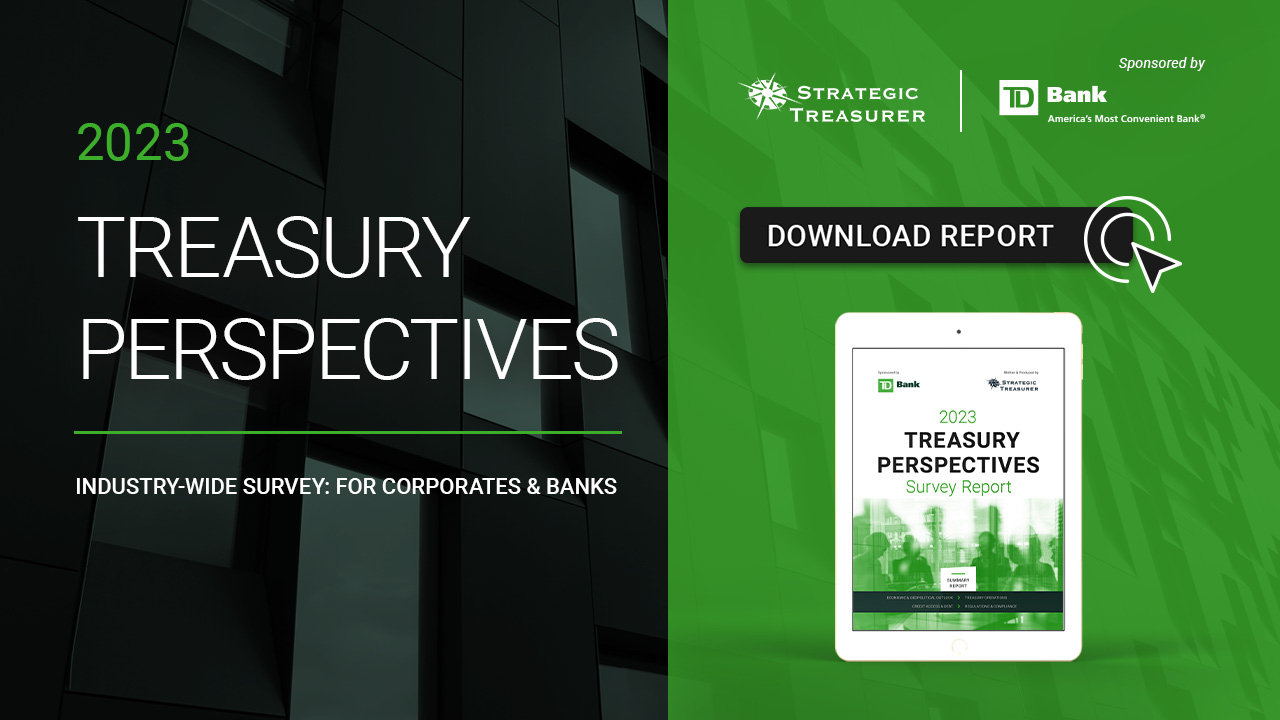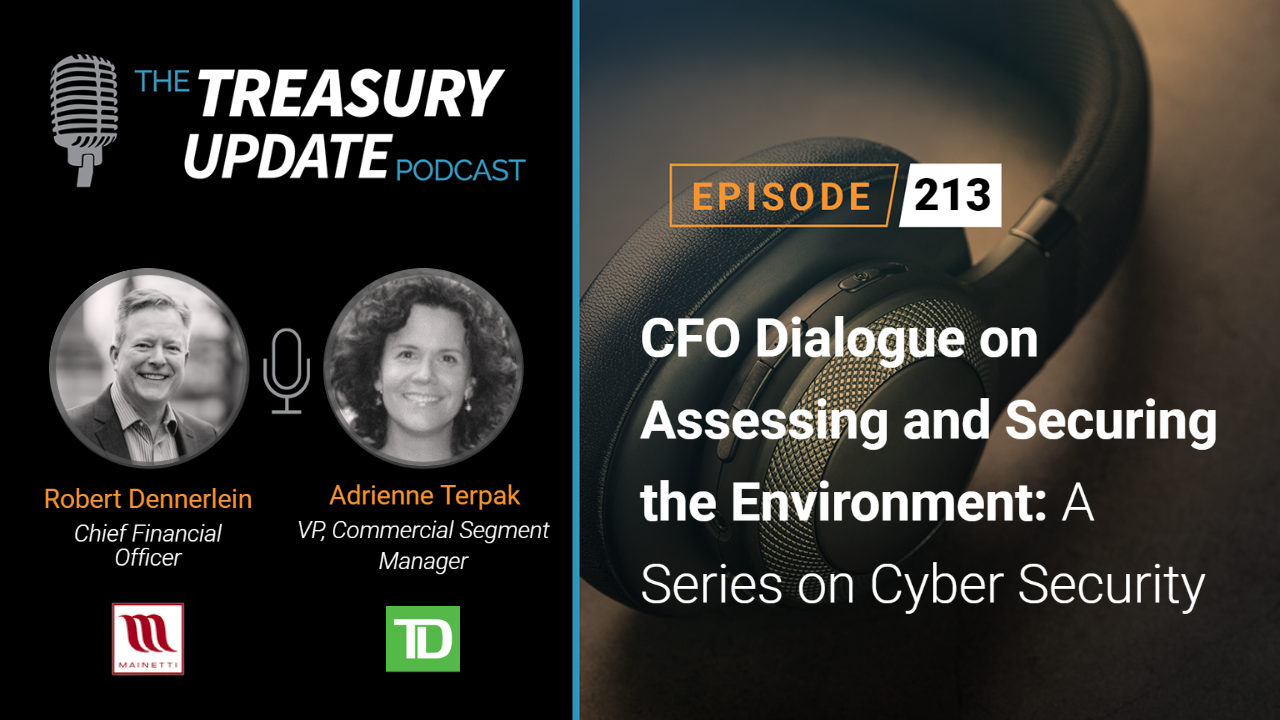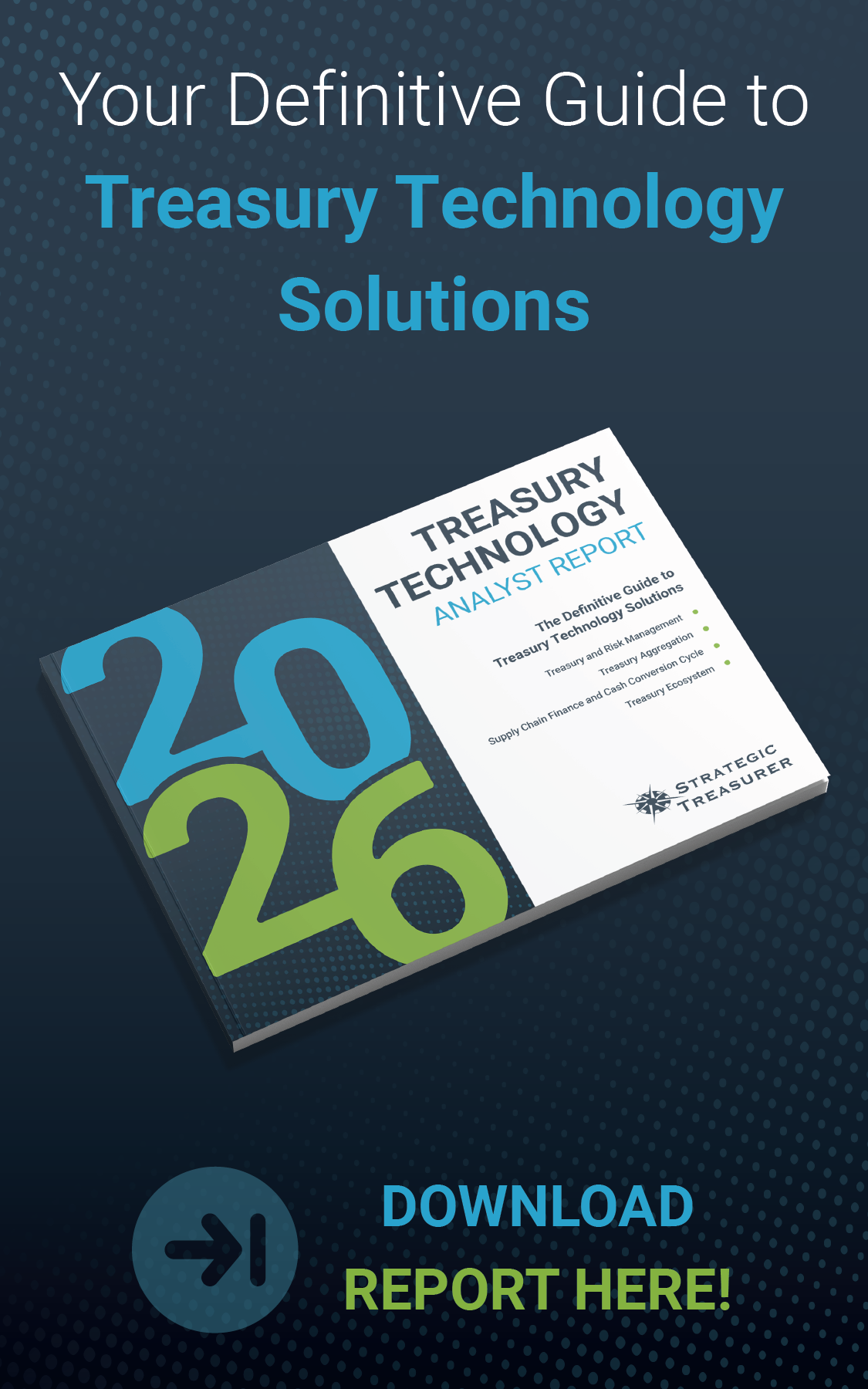
Episode 259
Treasury Perspectives Survey Results: Are You Nervous or Excited About Technology Developments?
In this episode, Craig Jeffery and Michael Gordon discuss key insights that emerged from the fifth consecutive Treasury Perspectives Survey. This annual survey is a collaborative effort between Strategic Treasurer and TD Bank. Listen in as they discuss the excitement surrounding technology developments, the top payment concerns, and what these findings mean for you as a treasury professional.
To explore the full survey report, download it here: Treasury Perspectives Survey 2023.
Host:
Craig Jeffery, Strategic Treasurer


Speaker:
Michael Gordon, TD Bank


Subscribe to the Treasury Update Podcast on your favorite app!
Episode Transcription - Episode # 259: Treasury Perspectives Survey Results: Are You Nervous or Excited About Technology Development?
Announcer 00:04
Welcome to the Treasury Update Podcast presented by Strategic Treasurer, your source for interesting treasury news, analysis, and insights in your car, at the gym, or wherever you decide to tune in.
Craig Jeffery 00:15
Welcome to the Treasury Update Podcast. This is Craig Jeffery, your host. Today I’m joined by Michael Gordon from TD Bank. Michael, welcome to the Treasury Update Podcast.
Michael Gordon 00:31
Thank you, Craig. It’s a pleasure to be here. It’s great to work with Strategic Treasurer and I look forward to the discussion.
Craig Jeffery 00:39
Can’t remember if it’s the sixth year or fifth year now that we’ve done the Treasury Perspectives Survey, that survey has, like five different major areas. And from those areas, there’s a huge number of questions. We wanted to have a conversation today about security and payments, innovation, and then also on tech developments, how that’s impacting organizations. And we just want to use some of the data from that survey as a launching off point for today’s discussion. So Michael, with your, with your kind permission, I wanted to begin with security, and then innovations. You know, as we look at fraud, on the payment side, we have multiple years of fraud that levels increasing concerns about it being higher, significantly higher. This is we see this survey after survey, not a new story. The issue of fear and concern is is quite high, companies may feel comfortable. But this level of fraud the incident the the frequency, the fraud that is getting through companies is is obviously a very big concern. In the short term security is the top payment concern. It’s number one, and we’ll talk about how that changes when we look at over time what the what the focus is on corporate treasury, corporate AP, how that looks different over time. But as you think about fraud and what’s occurring, any comments you have on your experiences and ideas on how to protect companies in these types of viewpoints that people have.
Michael Gordon 02:20
The threat level is increasing year over year. So it’s not surprising that the survey showed that in the results. And it’s not surprising that the number one concern among companies is payments, security and payment fraud. So let’s categorize fraud in a couple of different ways. We have account level controls. And if we also look at it from a corporate conduct perspective, fraud is much more than just the bank services is a broader problem. It’s just a portion of what the addressable problem is. So banks have done a good job at the account level in providing controls with services like positive pay, electronic authorization and ACH account filters account blocks were where the weakest or the most common vulnerability that we see nowadays. And we see this on a daily basis is in the corporate conduct, where fraudsters are targeting individuals firewalls have been put in place. A lot of technology has been leveraged to help protect us. But as the individual we see the compromise happening the most commonly, and criminals will attack this weakness, and they’ll continue to attack and exploit it. And there are some things that companies can do to mitigate this. There’s at TD Bank, we often talk about creating a risk management culture that ensures awareness of all threats and educating employees and training employees, using commercial reasonable procedures to ensure that you have rigor in your procedures, and test those procedures and retest those procedures. Fraud evolves along with technology, the more automated we get, the more automated the criminals get. And so we need to be diligent and continuously testing our procedures and making sure we have adequate controls in place.
Craig Jeffery 04:11
Yeah, those are those are those are good points, Michael. I know, there are certainly situations where it might not necessarily be security measures that are available through the banks, but other services like complete visibility to transactions and activity in your human firewall. Example is a good one, like what is the weakest link? Is it technical? Is it kind of compromise a person who may have control over the systems and so we’re certainly seeing that. You know, one of the one of the differences if we look at some of the data from the survey, security’s the top payment concern, the timing of payments was a the second most, and if we look at timing, this element of speed, global enterprises, those with like 25 or more treasury staff, AMEA and the rest of the world as well as small companies, that was about a third of organizations, identified speed of payments as the most important. So overall, it was number two, but those three identify this topic yet, on an overall basis. It was 24%. Any any thoughts on why speed is number two? I can see why fraud and concerns about security is number one. But did you have any thoughts about why speed is becoming is important at this level?
Michael Gordon 05:30
Yeah, I mean, when you think about detecting fraud, the sooner you understand when frauds have been perpetrated, the easier it is to recover from that. And so speed with this, think about reconciliations and simplify it, we step back a little bit company should reconcile on a on a daily basis, actually, instead of monthly or not at all, in some cases. I think the larger organizations that responded to this, from the survey, we get the sense that they’re in a better position to address that as we go downstream a smaller company, then you see that the reconciliations maybe not not happening as as frequently as they need to. And that creates more risk in the process and being able to detect what either just happened or be able to recover it. And I think so the the real time payments, part of that is, is being able to have good information, current information informed about what just occurred, or what’s about to occur with the payments. And I think that’s a that’s a big mitigator it’s a big it’s a it’s a nice tool or essential tool for companies to have is the speed of which the payments are happening have that information.
Craig Jeffery 06:40
One of the items as we look, as we look at the current concerns, it was fraud, and then speed, the way I look at where are companies expecting the largest amount of growth and innovation, the largest growth and payments innovation over the next three years? Number one is faster or real time processing. That’s 59% identified that. This is out of you can select all the options over there. Higher security, lower fraud risk, 49%, so about half. So it reversed as we look at what are the current issues, it’s fraud, and then speed, as we look in the next three years for innovation, its speed and then fraud. And then there’s integration and other aspects. So some some interesting trends. There’s a lot of information in the Treasury Perspectives Report that you can download. We’ll put that in the show notes.
Michael Gordon 07:33
And you know, Craig, you know, one takeaway from that, and as far as companies looking for that innovation, it may not be just the speed. It’s the automation and the digitalization that comes along with that removing friction from the from the system. The quicker we have the information, the more informed we can be, the better, but is that rich data that goes along through the bank system that companies can use in the real time payments, as an example, is a great tool for companies to be more efficient and better informed.
Craig Jeffery 08:05
All right, so continue our discussion, but shifting to the second topic about tech developments. The general headline is that excitement about tech developments far outweighs nervousness. And I know of late everyone’s talking about ChatGPT and different types of artificial intelligence and how that works. There is a there are some different views. How is the development, the rate of speed of the development, impacting treasurers what they’re doing today? How they hire staff? And does the nervousness and excitement differ between, let’s just say age cohorts or at least mindset cohorts? It’s interesting to note just by way of background before we talk about this, Michael, is that 77% of respondents or just over three quarters, agree that they’re excited about developing new technologies. And 4% disagree, right, they’re either, you know, the rest were neutral, of course, but 4% disagreed. 77% agreed. But the question about nervous about innovate innovations and artificial intelligence, and machine learning, as well as robotic process automation. 16% respondents, they were nervous about that. So that’s about one in six. So it’s not huge. It’s not it’s not the majority, but it’s a significant minority about what’s going on. Carrying that discussion a bit further. When we think about staffing, 44%, so four out of nine companies are concerned that their staff is not upskilling with tech fast enough. There’s a lot of changes, and they’re not upskilling with tech fast enough. So you know, as we think about groups and organizations as you think about it at the bank, and with your clients, what are some of your thoughts on the tech developments and excitement, nervousness and opportunities?
Michael Gordon 09:53
Yeah, a lot to unpack there. But as far as the excitement, it’s easy to understand why companies are excited by AI Artificial Intelligence, for example, and AI and some of the other innovations that everybody’s looking to be more accurate, more efficient, have better decision making tools. There’s the opportunity to automate routine tasks such as data entry, invoice processing, account reconciliation. So you can see why companies, the cohort that suggested that they’re excited about this, it’s easy to understand that financial operations will have the ability to be more predictive, and how they do their business, they’ll have real time insights, the errors will be reduced and optimizing their financial processes. Now, with all the good that comes with innovation, there’s also the downside, and the downside would come in the form of criminals also have access to this AI and their automation is matching our automation. So we need to keep pace with that.
Craig Jeffery 10:55
I mean, the the use of those deep fakes for for audio and video, it’s like, it’s, it’s pretty impressive when you see former president saying things that, you know, they didn’t say, but it looks it looked perfect. That’s obviously the ongoing concern.
Michael Gordon 11:09
That’s exactly right. The survey kind of brings that out. And that’s that small portion, that is they they were clearly concerned about it, I wouldn’t be surprised if what you just said is reflective of how those folks feel. With respect to the skill set, and what’s needed for running a financial organization, there there is the survey points to some concerns about having the right skills and the right talent to be able to leverage some of the new technologies being able to navigate the new technologies being more analytical than we have been in the past. So there, there’s better information available to us. There’s more information available to us. So the skill sets are going to require more analytical skills and comfort with the new technologies. And the innovation companies aren’t necessarily geared to that another key point that came out of the survey, and I may not have the numbers exactly right here. But companies are investing in their talent and in their technology at a rate that does not match the concern about having the right talent on board. And so there’s a discrepancy there. And that may imply that companies are a little bit behind they, they recognize that they need a different skill set, they need different technology, but they may be a little bit behind to where they want to be from investment in those fields.
Craig Jeffery 12:38
Do you think do you think that’s just the issue of the current labor market, or the fact that it may take people a little bit of time to get ramped up, or there’s a benefit, or a million different reasons?
Michael Gordon 12:51
Probably a million different reasons, Craig, but what we see often we have the opportunity to meet with 1000s of companies, right, we see a lot of best practices. And we see how, and even some not so good practices, we get an up front row seat to see how companies are managing this. And what is not uncommon is just the adoption, in the changeover and what’s needed. So we have folks that have been enrolled for a long time, for example, great employees, but they may not have the skill set that’s needed. To cycle through that and bring in the new, a newer mindset, maybe a different educated educational background, different experiences, and a comfort with that. I think I just think it takes, this is Michael speaking, it takes time to work through that. If you have a team of you mentioned companies with 15 employees, I think it would take time to work through that. And that that may be what we’re seeing.
Craig Jeffery 13:45
Interesting. Michael, one of the one of the areas where there’s a significant amount of concern 44% strongly agree or agree 36% or neutral. It’s about are concerned about our staff, not upskilling with new technology quickly enough. I know that’s something that we just spoke about. But when we think about that, how are we going to do that upscaling? Is it, what would be the mix of bringing in maybe new people who are focused more on tech less on treasury, or cash management? And how much is making sure that the existing staff is trained. How to go about doing that? I think that’s a challenging thing to answer properly. Right. It might depend on a few variables, but how do you advise companies on the the upscaling, internal resources, external hires?
Michael Gordon 14:36
Yeah, it’s a good question. I’m not sure there’s a one answer for that. I think there are many variables that go into it. We see opportunities and banks play a role in this, quite frankly, is to help companies train and educate their current staffs and teams on the technologies and the risk as we talked about earlier, that may be one way to do or is it in the near term? And then I don’t know, I think there does have to be a combination of fresh ideas and maybe ideas from outside an organization or experiences or education, whatever it is. Clearly the interest, I believe, is to be more as a financial operations and organization, I think the interest is to be more strategic, right and less tactical. And so it does require a change in mindset, or even a new mindset to be folded into the team to get where financial operations want to be.
Craig Jeffery 15:33
That certainly seems logical and appropriate. I know some companies are, if they have pretty deep treasury expertise, they’re like our gap is in the tech side. And so we want to hire people that are more technically savvy or more familiar with some of the new tools, we’ll teach them on the treasury side. But we need this area here. And other other areas are like we don’t have enough treasure resources. We need those. And we’ll try to tap into skills perhaps in other areas, the company but our first and foremost need is staff there. Thanks for some of those really good points, Michael. As companies look at their upskilling staffing and how they leverage this type of technology, certainly banks are developing this technology using it whether they’re developing it directly. They’re partnering with tech firms, they also need to look at their community of users. What are some of your thoughts on how our banks should precede how they collaborate? What are some of the key concepts are structures that need to be used to move forward effectively?
Michael Gordon 16:39
What I would suggest if companies are interested in these technologies, and you are open to piloting and partnering with your bank, there’s some great advantages to that for both parties. We’re testing and learning about what’s needed in the market. But we can’t do it ourselves. By working closely with the bank gives you opportunities to provide significant influence in the development of products and how they can be used. And further I would recommend communicate with your banks. Point out where we should be focused, how can we make your processes better, you can help us influence where we’re focused and where we’re spending our resources to better help you. So by all means, communicate opportunities, but then again, if you’re interested, be a willing partner or pilot some of our technology with us.
Craig Jeffery 17:31
That makes sense. Thank you so much for participating in today’s Treasury Update Podcast. Appreciate your comments. Thanks for joining me.
Michael Gordon 17:38
It’s always good to work with you, Craig. Thank you.
Announcer 17:45
You’ve reached the end of another episode of the Treasury Update Podcast. Be sure to follow Strategic Treasurer on LinkedIn. Just search for Strategic Treasurer. This podcast is provided for informational purposes only, and statements made by Strategic Treasurer LLC on this podcast are not intended as legal, business, consulting, or tax advice. For more information, visit and bookmark StrategicTreasurer.com.
Related Resources
Read our latest Treasury Perspectives Report today! For the 5th year running, Strategic Treasurer and TD Bank are proud to present the findings from the Treasury Perspectives Survey with data from over 350 respondents operating primarily across North America and Europe. This annual study polls treasury and finance professionals on their views regarding the economy, technology, industry innovation, and regulation to better understand top challenges and opportunities in the marketplace.








